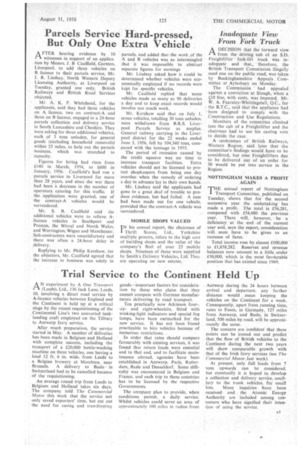Parcels Service Hard-pressed, But Only One Extra Vehicle
Page 35

If you've noticed an error in this article please click here to report it so we can fix it.
AFTER hearing evidence by 10 witnesses in support of an applica tion by Messrs. J. B Caulfield, Garston, Liverpool, to add three vehicles on B licence to their parcels service, Mr. J. R. Lindsay, North Western Deputy Licensing Authority, at Liverpool on Tuesday, granted one only. British Railways and gritish Road Services objected.
Mr. A. K. F. Whitehead, for the applicants, said they had three vehicles on A licence, two on contract-A and three on B licence, engaged in a 24-hour parcels collection and delivery service in South Lancashire and Cheshire. They were asking for three additional vehicles, each of 3 tons unladen, for general goods (excluding household removals) within 25 miles, to help out the parcels business, which was stretched to capacity.
Figures for hiring had risen from £140 in March, 1954, to £600 in January, 1956. Cauffield's had run a parcels service in Liverpool for more than 28 years, and since the war there had been a decrease in the number of operators catering for this traffic. If the application were granted, one of the contract-A vehicles would be surrendered.
Mr. S. B. Caulfield said the additional vehicles were to relieve Alicence vehicles in Southport and Preston, the Wirral and North Wales, and Warrington, Wigan and Manchester. Sub-contractors were unsatisfactory and there was often a 24-1-tour delay in delivery.
Replying to Mr. Philip Kershaw, tor the objectors, Mr. Caulfield agreed that the increase in business was solely in parcels, and added that the work .of the A and B vehicles was so intermingled that it was impossible to abstract separate figures for earnings Mr. Lindsay asked how it could be determined whether vehicles were economically employed if no records were kept for specific vehicles.
Mr. Caulfield replied that some vehicles made as many as 90 deliveries a day and to keep exact records would involve too much work.
Mr. Kershaw said that on July I, seven vehicles, totalling 30 tons unladen, were withdrawn from B.R.S. Liverpool Parcels Service as surplus. General railway carrying in the Liverpool district for the 22 weeks ended Tune 3, 1956, fell by 104,340 tons, corn.pared with the tonnage in 1955.
The period of recession caused by the credit squeeze was no time to increase transport facilities. Extra vehicles should not be licensed to protect shopkeepers from being one day overdue when the remedy of ordering a day in advance lay in their own hands.
Mr. Lindsay said the applicants had gone to a great deal of trouble to produce evidence, hut had failed, A case had been made out for one vehicle, provided that the contract-A vehicle was surrendered. • MOBILE SHOPS VALUED IN his annual report, the chairman of
Thrift Stores, Ltd., Yorkshire multiple grocers, refers to the high cost of building shops and the value of the company's fleet of over 25 mobile shops. Nineteen of these were supplied by Smith's Delivery Vehicles, Ltd. The are operating on new estates.




































































































